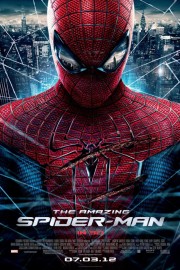The Amazing Spider-Man
I really want to love “The Amazing Spider-Man.” I really do. It’s got so many of the elements that make a great superhero movie. And yet, it doesn’t have the impact of the greats: your “Dark Knights,” your “Superman: The Movies,” your “X2: X-Men Uniteds,” your “Iron Mans,” your “Avengers,” or your “Spider-Man 2s.” Similarly to Sam Raimi’s “Spider-Man” film ten years ago, Mark Webb’s film tells an origin story. However, unlike Raimi’s admittedly flawed film, the new version lacks one, key ingredient…heart.
That’s actually a surprising occurrence, since Webb’s last film was all heart (2009’s “(500) Days of Summer”), and his film’s Peter Parker (Andrew Garfield, from “The Social Network” and “The Imaginarium of Doctor Parnassus”) and Gwen Stacy (Emma Stone, from “The Help” and “Easy A”) fell in love in real-life on set. And did I mention that Alvin Sargent– the secret, screenwriting weapon on Raimi’s second and third Spidey films –is a credited writer on this film along with James Vanderbilt (“Zodiac”) and Steve Kloves (seven of the eight “Harry Potter” films)? Seriously, what happened? Why didn’t I feel that instant connection with Peter and Gwen the way I did with Peter Parker (Tobey Maguire) and Mary Jane Watson (Kirsten Dunst) in Raimi’s 2002 epic?
In “The Amazing Spider-Man,” we get a glimpse of Peter’s parents, who leave him (under mysterious circumstances) with Uncle Ben (Martin Sheen) and Aunt May (Sally Field, particularly affecting in the role) when he’s a child. In his teens, Peter becomes curious again about what happened when he finds his father’s briefcase, with some of Richard Parker’s research in gene-splicing that he had done with Dr. Curt Connors (Rhys Ifans), who is hoping for the breakthrough needed to where, maybe, he can regenerated his arm (lost to disease). Does the research Peter uncovers hold a key, and if so, what might that mean?
Of course, such heady philosophical themes don’t really fit into the narrative Webb and his writers are forming; the point is to get Parker into a room of genetically-enhanced spiders, and Connors to take a risk that will lead to his transformation into The Lizard. It’s a shame that Webb and co. didn’t start at that basic, narrative idea, and then retell Parker’s origin story around that, because the more I think about it, the more I feel like that’s one of the key things holding “Amazing Spider-Man” back from being truly amazing. Say what you will about Raimi’s trilogy, but even the weakest movies and narrative threads had a specific idea behind it that drove the story, and inspired the actions of its characters. This same storytelling thrust is why Christopher Nolan’s Batman films have the power to endure– for both Nolan and Raimi, there’s a fundamental idea that grows into the larger story. Instead, the filmmakers are simply looking to reimagine Parker’s origin story as something darker, more wrought with emotional tension, for no rhyme or reason except for the fact that, well, Nolan did it for Batman, and look how that turned out. Like so many genre filmmakers following a game-changer, however, Webb and the producers studied the reading, but drew the wrong conclusions.
It’s killing me to be this negative about the film, because really, it’s not a bad movie (and there’s more than enough entertaining moments to justify a positive grade), more…disappointing. The cast is extremely good with what their given, from Garfield, Ifans, and Sheen to Stone, Field, and Denis Leary as Captain Stacy. Webb’s film is remarkably polished from a technical standpoint, with some great uses of 3D cinematography to the effects bringing Spidey and The Lizard to life during the action scenes. And if for no other reason, I want to purchase James Horner’s dynamic score, not to study it in comparison to Danny Elfman and Christopher Young’s work for Raimi, but to further appreciate what the “Titanic” Oscar-winner has brought to the table musically. A sequel is all but assured; the question I’m left asking after “The Amazing Spider-Man” is whether Webb and his collaborators will take that quantum leap in quality Raimi did between “Spider-Man” and “Spider-Man 2,” or will audiences find themselves dumbfounded how the filmmakers let such a great franchise get away from them, as happened with the “Superman” films of the ’80s, or the “Batman” movies of the ’90s. I’m definitely hoping for the former; the character, and this cast and crew, deserve the chance to get this right.










